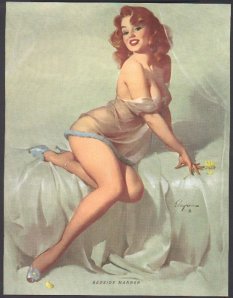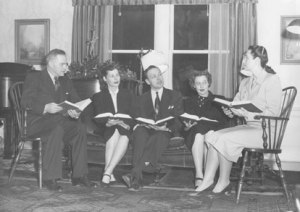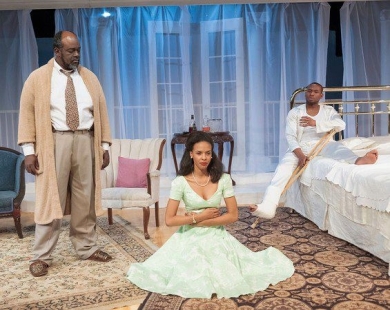
A casting call for showgirls, 1920s. This is exactly how I’m running callbacks for Troilus and Cressida.
I love auditions. I always have and I always will. I will happily sit through day-long auditions. I recognize, however, that auditioning is a deeply flawed process with huge limitations.
For that reason, I also hate auditions. Their artificiality makes it difficult to understand how an actor works in a rehearsal and performance process. There’s also a hierarchical feeling to auditions that makes me uncomfortable. I see actors as co-creators rather than as puppets who execute my vision. I think I’m auditioning for them as much as they’re auditioning for me. But the reality is: I have more actors in front of me than I have roles to fill. Some will hear “yes” and some will hear “no,” and I hate that. The fact remains that I must find a way to make decisions about who will populate the plays I direct or produce.
Taylor Mac wrote a great article about casting a couple of years ago, saying that we should completely do away with auditions and instead cast people we get to know through work in the community or working with them directly. This is, of course, a fantastic way to get to know actors– I’d even say the best way. But it’s not something that can replace auditions outright.
I use a combination of both techniques. I cast people without an audition (or bring them straight to callbacks) if they’re someone I’ve worked with before, or someone whose work I’m familiar with. But I just can’t envision completely giving up auditions, because I think, as flawed as they are, they offer something unique to theatremaking that we can’t do without.

One of the PR shots for my production of Othello at Impact Theatre. Skyler Cooper, my Othello, came in to audition for Macbeth the previous year and blew us away. I had never heard of her as she was new to acting after spending years in the Air Force. Impact’s lesbian Othello was one of the most successful shows we ever did, and I would never have found Skyler were it not for our open auditions. Pictured: Marissa Keltie and Skyler Cooper. Photo by Cheshire Isaacs.
The New Kid on the Block. Over and over again, I’ve had someone I’ve never heard of before walk into an audition and blow me away. They’re new to the area, recently graduated, or new to acting. Often an open audition is the only chance they have to break into a new market. This is especially true for actors who are traditionally marginalized. If you’re not getting cast, I have no way to get to know your work unless I hold an open audition. An open audition allows actors who have no other pathway access to directors, casting directors, and artistic directors. I think preserving that access is crucial.
Growth and development. Yesterday we had our first day of season auditions, and no less than three actors I’ve seen multiple times before gave auditions that almost knocked me out of my seat. Three actors showed up with auditions that were leaps and bounds better than anything I’d ever seen them do before. One did a piece outside of what one of my directors had considered her type, based on the pieces and shows he’d seen her do previously, and changed his entire conception of her abilities. There’s a special kind of joy in watching an actor develop over the years. I’ve seen actors go from green, timid, and wobbly recent graduates to powerhouses in just a few years. I’ve seen powerhouse recent graduates mature into wider and wider ranges and abilities. I’ve seen mid-career actors push through to new levels, mature into new types, discover new approaches. It’s deeply satisfying to see, and it’s something we might not see outside of auditions. If I “know” what your type, range, and abilities are, I might not prioritize coming to see your show in favor of seeing a show stacked with actors I don’t know. I can only see so many shows, so I have to pick and choose. Additionally, you might get cast consistently as a certain type, but have the ability to push out of that range into something new. An audition will give you the opportunity to show us that.

Impact resident actor Mike Delaney in the world premiere of Toil and Trouble by Lauren Gunderson, directed by Josh Costello. Mike auditioned for a show I was directing at CSU East Bay years ago. Now he’s a core member of my company. Photo by Cheshire Isaacs.
Actors as co-creators. When you do an audition monologue, theoretically, at least, this is material you’ve chosen for yourself, performed with choices you’ve made. The choices you make show me something about who you are. I want to work with people who bring something special to the table, who have interesting things to offer as co-creators of the work. When I go to see a show, often I have no way of knowing which choices you’ve made and which choices the director’s made, and that balance is going to differ depending on who the director is, how s/he works, what kind of relationship the director has with that particular actor, what kind of relationship that actor has with the director’s concept, etc. There are a huge number of variables that affect how deeply an actor is directed in any given production.
An actor came in to auditions yesterday doing a piece from a show he had performed, directed by someone I know very well. While he was a skilled performer, his piece looked, smelled, and tasted like the director. All I could see was the director. He came recommended by another actor whose opinion I trust, so I’ll call him back, specifically to see who he is as an actor. His audition just didn’t answer that question for me.
I’m not just looking for actors; I’m looking for collaborators. I don’t want minions; I want accomplices. I’m auditioning people so I can see both what their skills are and what kinds of choices they make.
Change Our Minds. Every so often, I think I know what I want for a certain character, and then an actor shows up who changes my concept completely. I had a short list of actors I was considering for a particular role in the show I’m directing this fall, and an actor I’d never seen before came to auditions yesterday and changed my mind. In the middle of his monologue I suddenly realized that I wanted something completely different for the character. I could see him as the character, and it brought a different context and more depth to the role than I had previously considered. Now he’s my frontrunner for the role. 24 hours ago, I had never heard of him.

Chris Quintos in Impact’s production of The Chalk Boy by Joshua Conkel, directed by Ben Randle. Photo by Cheshire Isaacs.
Despite their drawbacks, auditions are a very useful tool. I have a love/hate relationship with them, but I’ll continue to rely on them.
P.S. I have some articles about audition tips you can check out here and here, and some casting advice for actors here.

















